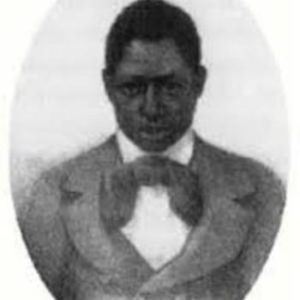
James Whitfield
*James Whitfield was born on this date in 1822. He was a Black poet, abolitionist, and political activist.
James Monroe Whitfield was born in Exeter, New Hampshire, to Nancy (Paul) of Exeter and Joseph Whitfield, who escaped enslavement in Virginia. Through his mother, he was the nephew of Rev. Thomas Paul of the African Meeting House in Boston and Jude Hall, a veteran of the Revolutionary War. The small family home was on Whitfield's Lane, renamed Elliot Street, in 1845. James Whitfield attended Exeter schools until his father died suddenly when he was nine. His mother, Nancy, had died when James was seven, so James and his siblings were moved out of town, possibly by his sister. The following records find him in 1839, living in Buffalo, New York, as a barber at 30 East Seneca St.
He owned the shop and his home on South Division St. Besides running the barbershop, Whitfield would write in his free time, publishing his papers by age 16. Whitfield married Frances Lewey on July 12, 1843, in Cuyahoga County, Ohio. They had three sons: James Lewey Jr., Charles Henry, and Walter B. His grandniece was Boston writer and playwright Pauline Elizabeth Hopkins. In her fiction novel of 1900, Contending Forces, she describes a scene at James' home in Exeter with his mother. A 2008 book by Lois Brown goes into detail. Whitfield published a small volume of 1853 entitled "America and other poems" (publisher James S. Leavitt of Buffalo), which was dedicated to his friend Martin Delany. Half of the poems are about slavery, and the other half are about art, nature, or people, such as John Quincy Adams, Daniel Webster, or Joseph Cinque.
Whitfield found success publishing poems about abolitionism elsewhere, many printed in The Liberator and The North Star. Whitfield's poems often expressed the oppression affecting blacks and moral corruption in politics and religion. One of Whitfield's most famous poems was America, published in 1853 in his poetry book. The poem embodies many of Whitfield's ideas about the hypocrisy of American freedom and democracy and the difficult lives for both freed and enslaved Africans in the US. In 1850, Frederick Douglass visited Whitfield's barbershop. Douglass became deeply impressed by Whitfield's poetic abilities, calling him in the 1850 Anti-Slavery Bugle a "sable son of genius." Douglass was also impressed by his passion for abolition, commenting that his job as a barber was "painfully disheartening."
Although Levine & Ivy, contemporary scholars, contend that the shop was perfect for networking and exchanging ideas. Beyond abolitionism, Whitfield became a prominent member of the Colonization Movement, a popular movement focused on Blacks returning to Africa and indigenous parts of the South or Central Americas. Whitfield broke with Douglass, who was not in favor of emigration, and joined with Martin Delany, who favored Haiti or Central America as a location. In August 1853, Delaney, Whitfield, and others called for a national convention to address the topic to be held in August 1854 in Cleveland, Ohio, which was published in Douglass' North Star. A heated debate between Douglass and Whitfield was published in several issues after that, which helped frame the issue. Whitfield became involved in a proposal by Missouri Senator Frank P. Blair to establish a colony for Black colonization in Central America.
After the Emancipation Proclamation was issued, Whitfield dropped the emigration issue and moved to California, where he believed there was still an opportunity for Blacks to flourish without oppressive laws. His home was at 918 and then 1006 Washington St., and his barbershop at 916 Kearney St., all of which he owned. Whitfield joined the Prince Hall Freemason Hannibal Lodge #1 and later served as a Worshipful Master for their California Grand Lodge 1864-69.
On April 23, 1871, James Whitfield died of heart disease in San Francisco at 49. Whitfield was interred at the now-defunct Masonic Cemetery. He was a notable writer and activist in abolitionism and African emigration during the antebellum era. He published the book "America and Other Poems" in 1853, which is still in print and is held in the Library of Congress. Whitfield's birth town, Exeter, New Hampshire, reads aloud a Whitfield poem at their annual literary festival.